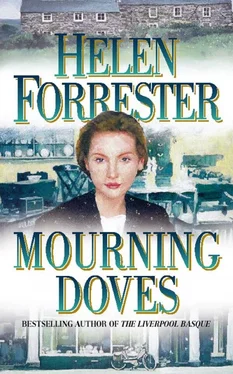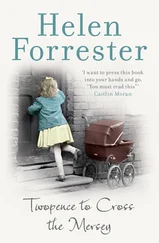Upstairs, she shivered as she stripped off her clothes still damp from the perspiration of the previous night. She hung up her black skirt to air, and left the rest in a pile on her undisturbed bed for Dorothy to take away to be washed.
Looking down at the smelly garments, she realised dully that she did not know how to wash clothes properly, and she wondered if they would be able to employ a washerwoman. Even during the war, when they had had to manage the house with only Winnie living in, they had been able to find women to do the washing and clean the house; they were usually army privates’ wives, living on very small army pay, who had children whom they did not want to leave alone for long. They had been thankful to come in by the day to earn an extra few shillings.
As she washed herself in the sink of the jewel of her mother’s house, the bathroom, which glittered with white porcelain and highly polished mahogany, she remembered the earth lavatory of the cottage. Such primitive sanitary arrangements meant that they must take with them the old-fashioned washstands with their attendant china basins, jugs, buckets and chamber pots; she recollected that three rooms in their present home were still equipped with these pieces of furniture. And there was a tin bath in the cellar – they would need that, with all the work that it implied – heating and carrying jugs of hot water upstairs to a bedroom, and afterwards bringing down the dirty water, not to speak of the dragging up and down of the bath itself, all chores that she herself would probably have to attend to.
While she brushed her hair and then tied it into a neat knot to be pinned at the back of her neck, she wondered resentfully whether, in addition to all the usual jobs her mother expected her to do, she was going to spend her whole future trying to deal with the domestic problems of the cottage.
Later, when she was dressed, the last button of a clean black blouse done up and a black bow tied under her chin, she paused to look at herself in the mirror, and made a wry face. She looked pinched and old. She was drained by the fears besetting her, acutely aware of her own ignorance. Even Ethel, struggling to make the fire go in the breakfast room, was not as helpless as she was. At least Ethel could make a fire and could probably cook a meal on it if she had to.
Why haven’t I learned to cook? she asked herself dully. Or even watched Mrs Walls, when she comes in on Mondays to do the washing? Or looked to see in what order Dorothy does the rooms, so that she doesn’t redistribute the dust? And as for making the cottage garden look decent, I don’t know how to begin.
The answer was clear to her. As a single, upper middle-class lady, she was not expected to know. Her job was to run after her mother, be her patient companion, carry her parcels, find her glasses, help her choose library books in the Argosy Library, make a fourth player at cards if no one else was available, write invitations and thank-you notes – and be careful always to be pleasant and never give offence to men, particularly to her father. And when her parents were gone, she would probably do the same for Edna – tolerated in her brother-in-law’s house, either because Edna had begged a roof for her or, on Paul’s part, from a faint sense of duty to a penniless woman.
‘I wish I were dead,’ she hissed tearfully at the reflection in the wardrobe mirror, and went down to the breakfast room to find a pencil and make a list.
While Dorothy and Ethel finished cleaning the breakfast room, Celia, list in hand, went down to the basement to talk to Winnie.
On seeing her young mistress, the cook hastily rose from eating her own breakfast at the kitchen table. With the corner of her white apron, she surreptitiously dabbed the corners of her mouth.
‘Don’t get up, Winnie. Finish your breakfast. I just thought I’d have a word with you, before Mother rings for her tray.’
Winnie sank slowly back into her chair and picked up her fork again. She looked cautiously at Celia, who had walked over to the kitchen dresser and taken down a cup and saucer. The girl looked as if she were on the point of collapse.
‘Would you be liking a cup of tea, Miss?’
Celia laid the cup and saucer down in front of the cook, and then pulled out another kitchen chair to sit down on. ‘Yes, please, if you can spare it from your pot.’
‘To be sure, Miss.’
While Celia slowly sipped a very strong cup of tea and Winnie finished up her egg and fried bread, both women basked in the warmth of the big fire in the kitchen range. Ethel had made it ready in anticipation of Winnie’s beginning the serious cooking of the day as soon as she had finished her own meal.
The heat was very comforting, and some of Celia’s jitteriness left her. ‘I was wondering, Winnie,’ she began, ‘if one of you could come out to the Meols cottage with me and help me clean it. I think it will take more than one day. Could two of you manage, here, to look after Mother? I think I may have to be quick about making arrangements, and we can’t move anything from this house until the other one is clean. Mr Billings, the agent, will be going out there today to make sure it is watertight.’
At the reminder of the impending demise of the household, poor Winnie’s breast heaved under her blue and white striped dress. Her response, however, showed no resentment. She said helpfully, ‘Oh, aye, Miss. Our Dorothy would be the best one to take – and you’d need to get the chimneys swept, no doubt.’ She paused and ran her tongue round her teeth, to rid them of bits of egg, while she considered the situation. ‘Anybody living nearby will put you on to a sweep, I’m sure. And you’d have to take brooms and brushes – and dusters and polish with you, wouldn’t you?’
In twenty minutes, Winnie had a cleaning campaign worked out. She inquired whether the water in the house was turned on.
Feeling a little ashamed at how low they had sunk, Celia admitted that there was only a pump that did not work and a well of uncertain cleanliness. She said hopefully, ‘I think Mr Fairbanks from next door would let us take water from his pump for a day or two. He’s very nice.’
‘Would he? That would be proper kind. A friendly neighbour’s worth a lot.’ Winnie heaved herself out of her chair and began to clear the table. ‘You’d better get a plumber to fix the pump, hadn’t you? You could ask him what to do about the well. He’ll know – and I’ll put together some lunch for you.’
Celia began to feel that her life was regaining some sense of order, and she looked gratefully at the cook. ‘You’re wonderful, Winnie,’ she said with feeling, as she took her empty teacup to the kitchen sink ready for Ethel when she came down to the basement kitchen to do the washing up.
At that moment, Dorothy, carrying her brooms, bucket, dustpan and brush, and carpet sweeper, pushed open the kitchen door. She was bent on snatching her breakfast before she had to serve Louise and Celia their meal. Winnie told her immediately that she would be spending the next day in Meols, cleaning Miss Celia’s new home.
Dorothy opened her mouth to protest, and then decided that it might be a bit of a change. She nodded assent, and said, ‘Yes, Miss,’ to Celia very primly, as if being whisked out to Meols was something that happened regularly to her. Then she hung up her dustpan and brush in a cupboard, and picked up the carpet sweeper again to take it outside to empty it into the dustbin. She unlocked the heavy back door and trotted into the brick-lined area outside.
As she opened the flaps of the carpet sweeper and shook out the dust, she could hear, very distantly, Ethel singing ‘The Roses of Picardy’, as she scrubbed the front steps, and she began to regret her agreement to go out to Meols. Out there, it would likely be scrubbing, scrubbing all the way, she considered sourly, as she clicked the sweeper shut. Why hadn’t she suggested that Miss should take Ethel instead?
Читать дальше












